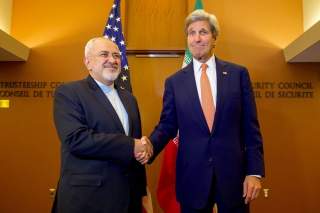There's Still a Lot We Don't Know About the Iran Deal
The deal has been marked by lack of transparency from the beginning.
The implication of closing the PMD file is that Iran has not been officially declared an NPT violator, and this creates the basis for its claims to confidentially. By not clarifying that the entire case against Iran turns on its deceptive behavior, the official narrative fails to underscore that Iran not only does not deserve “normal” treatment, but that its record of behavior demands an extra measure of scrutiny. Iran intends to significantly expand its enrichment program, to remain very close to breakout capability, and shows no indication of moving away from its nuclear ambitions. Indeed, Iran fought hard to hold on to its breakout capability, and its success finds expression in a deal that only extends breakout from two or three months to a year.
A year after introducing the JCPOA, the focus of debate has shifted from the problematic provisions of the deal itself to the attitude displayed by the Obama administration toward the deal. The ISIS report is simply one more case of unjustified lack of transparency, followed by unconvincing U.S. excuses and explanations, which leave one less and less confident about the deal and the United States’ intent to uphold it.
However we look at this, U.S.-Iran dynamics will be a key factor in the implementation of the deal, and in determining whether Iran is able to manipulate its way to nuclear weapons. U.S. passivity—not to mention acting as Iran’s defender—risks weakening America’s ability to keep Iran in line. The United States must wake up to the reality that the struggle with Iran continues, at least as far as Iran is concerned. Not responding to Iranian challenges risks losing the game.
Emily Landau is a senior research fellow at the Institute for National Security Studies (INSS) and head of its Arms Control and Regional Security Program.
Image: Secretary of State John Kerry shakes hands with Iranian Foreign Minister Javad Zarif on April 19, 2016. Wikimedia Commons/U.S. Department of State

